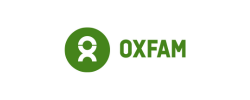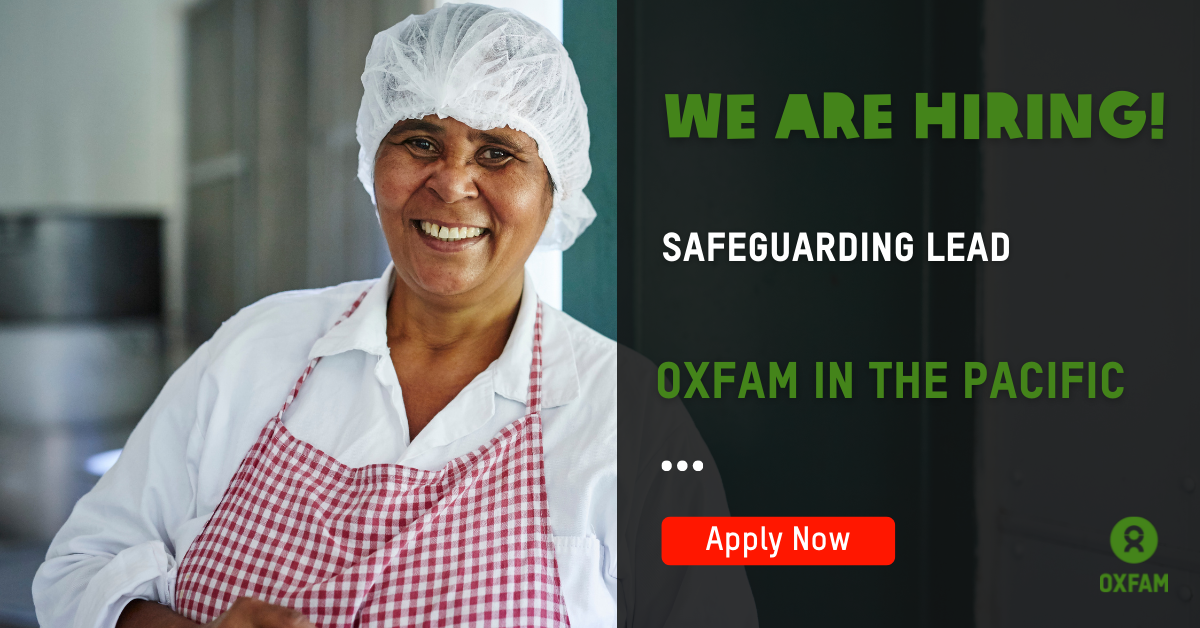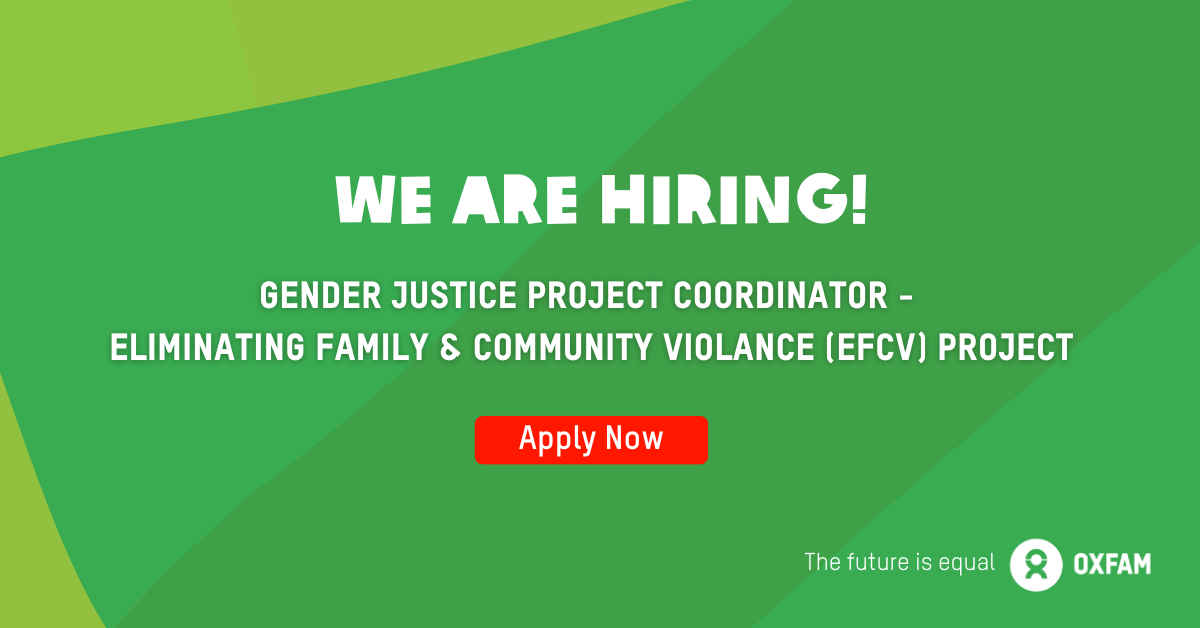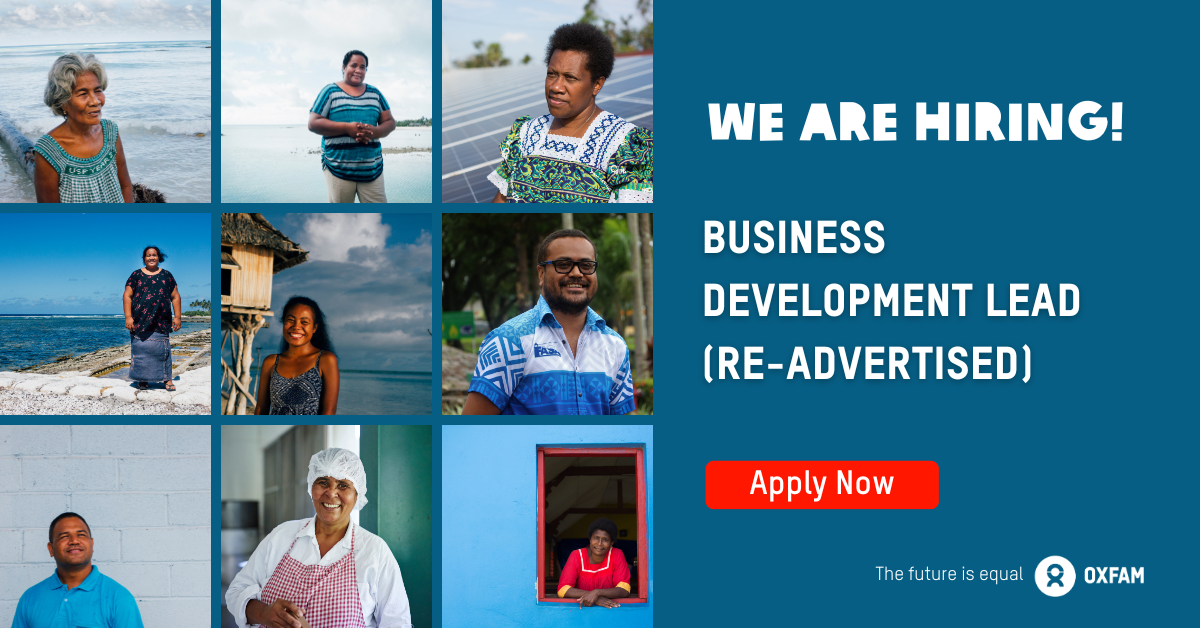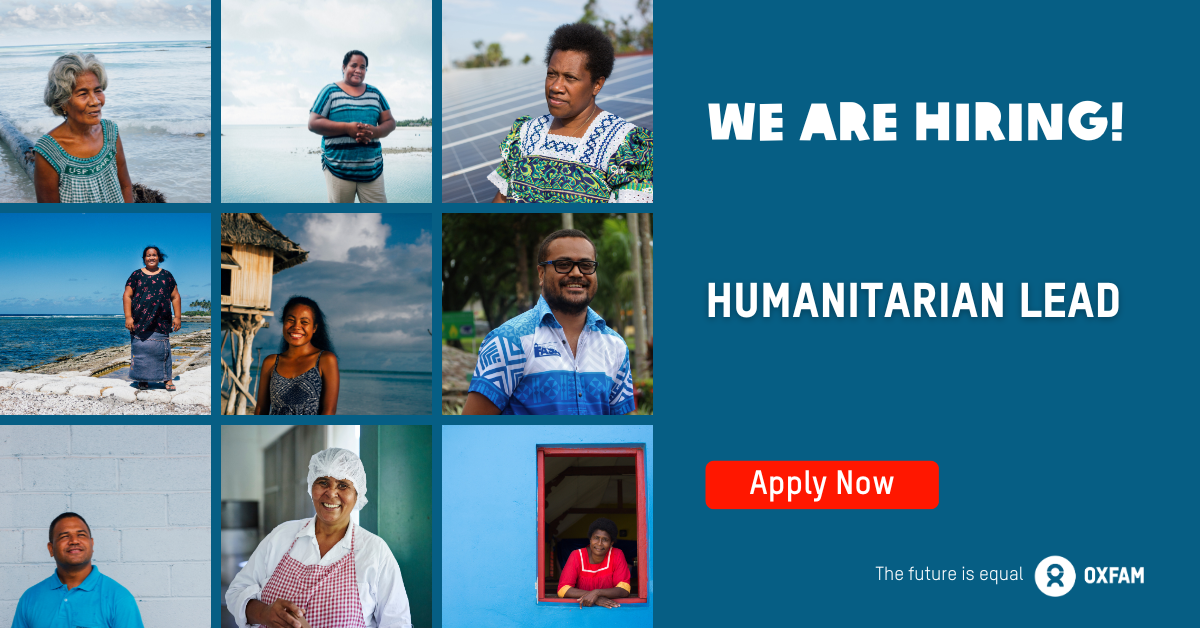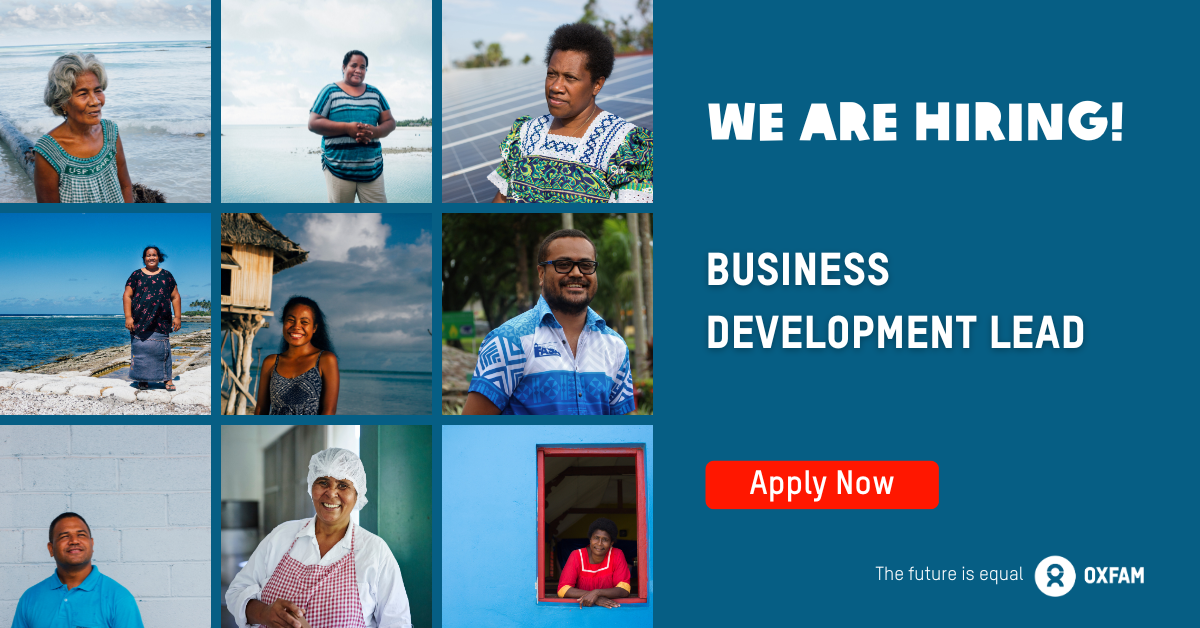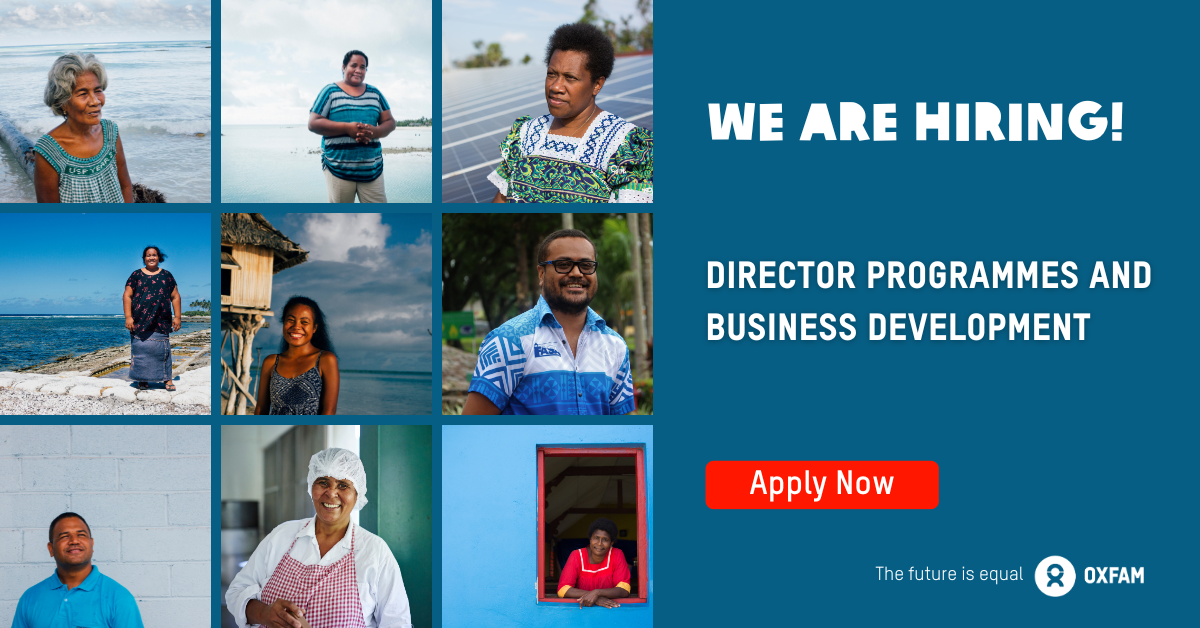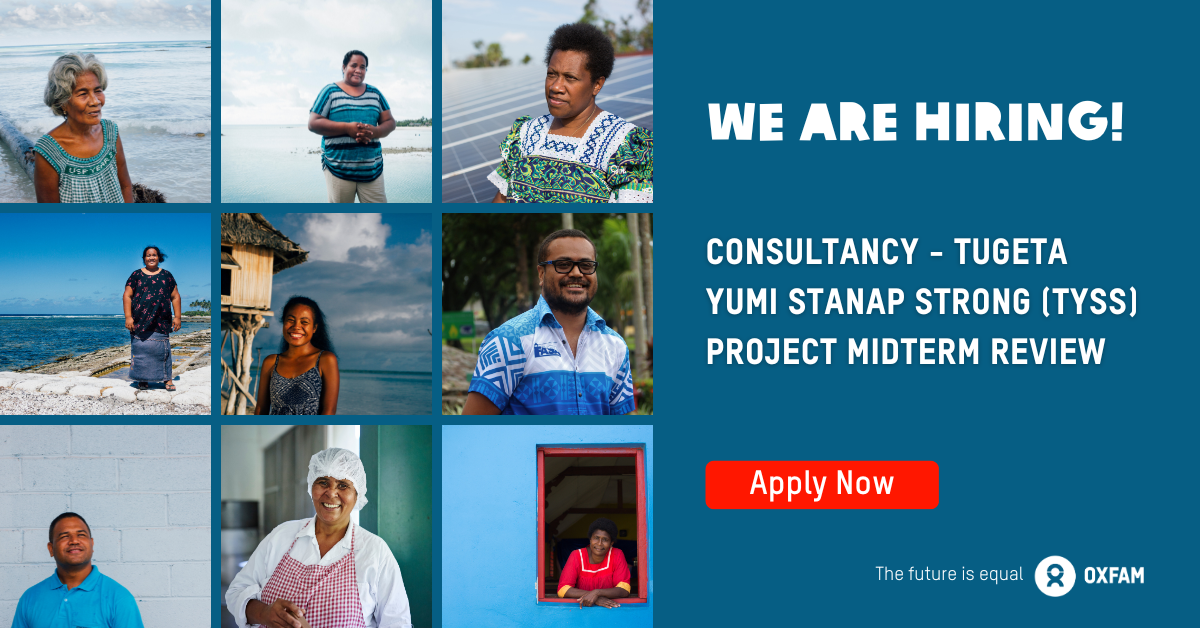Reporting to: Associate Director- Strategy, Operations and Culture
Location: Pacific Region
Staff reporting to this post: N/A (Matrix reporting of Safeguarding Focal Points)
Total Workforce: Approximately 100 across the region
Annual Budget: $15m AUD
Job Family: Human Resources/ Programme
Salary Grade: C1
Role Description: HERE
Application Closing date: Applications close 1 September 2022
Shaping a stronger Oxfam for people living in poverty.
OXFAM IN THE PACIFIC VACANCY
SAFEGUARDING LEAD
Job Purpose
Reporting to the Associate Director Strategy, Operations and Culture, the Safeguarding Lead plays a key role in providing oversight, leadership, technical expertise, and guidance on Safeguarding for Oxfam in the Pacific. The position is responsible for strengthening individual and organisational capacity of Oxfam in the Pacific and its partners to prevent sexual harassment, exploitation and abuse and to create safe programming and working environment in all Oxfam programme.
Context
Oxfam is a global aid and development organisation that mobilises the power of people against poverty working through staff and local partner organisations across the Pacific to combat gender, economic and climate injustice, including in situations of crisis. Oxfam in the Pacific works to support the following countries in the region: Papua New Guinea, Vanuatu, Solomon Islands, Fiji, and the Polynesia/Micronesia country cluster comprising of Samoa, Tonga, Tuvalu, Cook Islands, Niue, Kiribati, Palau, Nauru, the Federated States of Micronesia (FSM), Republic of the Marshall Islands (RMI) (Micronesia). Country teams operate with a mix of direct implementation and via partners, the goal being to increase strategic partnerships where appropriate.
Our work is guided by Oxfam’s global values and by Pacific values and culture including openness, flexibility, respect, equity, justice, solidarity, collaboration, sharing and humility. We also value local ownership and leadership of change processes.
Team Purpose
Oxfam in the Pacific comprises three divisions: Programs, (Program Delivery and Business Development), Strategy Operations and Culture (SOC) (Finance, People and Culture, Operations and PMRU) and Partnerships, Evidence, Learning & Innovation (PELI).
The role sits within the Strategy Operations and Culture (SOC) division. The Strategy Operations and Culture (SOC) division comprises People & Culture, Finance, Performance Management Risks Unit (PMRU), Safeguarding, Logistics, IT and Operations. The division is responsible for critical functions that provide necessary support to our PELI and Programs divisions.
This role is accountable to and reports to the Associate Director Strategy Operations and Culture.
Key Responsibilities and Accountabilities
Key Responsibilities
Safeguarding Leadership, Strategy & Culture
- Lead and support the overall design, development, implementation and monitoring of Oxfam in the Pacific’s (OiP) Safeguarding strategy and function.
- Responsible for establishing OiP’s safeguarding committee that consists of country dedicated safeguarding focal points and country leads to operationalize the implementation of the strategic and operational functions of the committee ensuring a robust safeguarding system and process is maintained.
- Ensure that all local and global safeguarding policies and procedures are kept up to date, new policies and procedures are embedded, incorporate lessons learnt, comply with government and donor’s requirements and our commitment to transparency and accountability.
- Actively promote integrity throughout the organisation and engage managers to play an active role in enhancing our value-based ways of working, detecting, and proactively reacting to any arising misconduct.
- In collaboration with Human Resources, drive and support the promotion of good safeguarding culture amongst Oxfam staff and create safer recruitment policies and practices.
- Working with both People and Culture and Programs team, provide technical assistance to strengthen safeguarding at project, program and where required country level, contributing to build or enhance prevention, detection and response mechanisms.
- Lead implementation of local safeguarding initiatives in line with the organisational safeguarding strategy.
- Ensure timely and accurate reporting on safeguarding reports to management, the board, and relevant stakeholders through working with Associate Director SOC.
- Represent OiP on sector wide safeguarding initiatives.
- Contributes to and manages safeguarding budget in line with guidance and direction from Associate Director SOC.
Supporting the transition into Affiliation
Being an Affiliate comes with Safeguarding responsibilities that will require technical expertise in Safeguarding to ensure the Pacific Affiliate is able to meet the expectations of communities, partner organisations, staff and associated personnel and donors.
The Pacific operating as a Partnering Affiliate will be required to:
- Work with our Pacific colleagues to change Safeguarding from compliance to a part of who we are and what we do.
- Have Safeguarding case management expertise. The Safeguarding Lead would be required to case manage from start to finish and be able to engage suitable investigative expertise if required.
- Manage all cases in the Global Case Management System (CLUE). This system requires the Pacific to request and be issued licences for use. Access is heavily restricted, so a licence would sit with the Safeguarding Lead.
- Work with donors to ensure the Pacific Affiliate is meeting all the donor Safeguarding policy minimum standards.
- Navigate the donor reporting protocols, ensuring reporting timelines are met.
- Report to other Affiliates with donor funding present in a Pacific country where a Safeguarding case arises.
- Be a member of the One Oxfam Safeguarding Shared Service, attending meetings and contributing to confederation wide Safeguarding projects.
- Work with the other PA’s in the Asia Pacific region to have a network of skilled Safeguarding staff.
- Work with communities and partner organisations on designing SG Feedback and Complaints mechanisms to ensure that the community members, including children, women and persons living with disability and other minority groups are consulted on how they want to report SEAH & Child issues.
Capacity Building and Safe Programming
- Lead on the development and implementation of safeguarding Induction and training and in creating continuous awareness of staff, partners and key stakeholders.
- Lead on working with partners to understand and assess support required to ensure partners have systems, policies and mechanisms in place to prevent and response sexual harassment, exploitation and abuse.
- Work with project managers and the Programme strategy and impact team in ensuring all programming is safe for people to engage with, integrating gender, accountability and safeguarding issues in the theory of change, specific resources and activities, and monitoring implementation to make sure it becomes a reality.
- Assist People and Culture department create and maintain information on local referral pathways for survivors (to include medical, psychosocial, legal, security).
- Conduct/co-ordinate/contribute to PSEA training activities in collaboration with Regional SG Adviser and EAs, engaging other Affiliates and stakeholders.
- Ensure SGFPs are trained online and f2f, thereafter, leading a community of practice for continuous learning.
- Ensure that the Program Minimum Standards as they relate to SG are implemented, reviewed, and reported against.
- Provide technical support to Programs staff on best practice SG at project design phase, including the development of SG Community Feedback and Complaints mechanisms.
- Provide training to Programs staff on how to conduct SG risk assessments and mitigations.
Policy and Compliance
- Ensure One Oxfam Safeguarding core standards are implemented across OiP to ensure compliance to Oxfam global standards.
- Lead development of the OiP annual safeguarding action plan as it relates to program procedures and processes and coordinate six-monthly and end of the year report.
- Responsible for the development of organisational policy on all matters relating to safeguarding with the guidance of the Associate Director- Strategy Operations and Culture (ADSOC).
- Oversee case management of safeguarding within OiP and ensure Oxfam policies and procedures in relation to safeguarding are followed and implemented.
- Guide Incident Management Panel in the investigation process ensuring the panel understands their roles and responsibilities.
- Ensure confidentiality and timely case reporting, investigations, and management within OiP and Oxfam global where required.
- Work collaboratively with People and Culture to ensure due process is followed and implementation of action items following case closure.
- Keep Executive Leadership Team abreast of any development and ensure proper advice and guidance is accorded to ELT as and when required in relation to Safeguarding.
- Liaise closely with external investigators where required including collaborating with Risk and Management team to ensure proper implementation and case management.
Management
- Participate in Oxfam performance management framework and activities.
- Ensures the security and safety of others and Oxfam property.
- Provide recommendations relating to improved local procedures and processes.
- Keep abreast with local legislative changes and requirements and its implications for OiP.
- Report risks and incidents to supervisor.
Representation and Relationships
- May be expected to represent Oxfam in industry or professional networks.
- Support the representation on key committees as and when required.
Child Safeguarding
As an agency undertaking work both nationally and internationally and in humanitarian responses, Oxfam takes its duty of care seriously to safeguard children and recognises that it must meet community expectations and the trust placed in its personnel to maintain the highest standards of conduct with children. Therefore, all positions within OiP are required to understand and comply with the Child Safeguarding Policy, Code of Conduct, toolkit and Social Media User Policy.
- This role requires work in communities or schools (overseas and domestic) on a regular basis.
- This role requires Oxfam representation when occasionally visiting the field (overseas and domestic).
- This role requires access to information relating to children.
- This role involves making decisions which may affect children, including volunteers and other supporters under the age of 18
Other
- Eager and required to adhere to Oxfam’s principles and values as well as the promotion of gender justice and women’s rights.
- Understanding of and commitment to adhere to equity, diversity, gender, child safety and staff health and wellbeing principles.
Job Requirements
Key Skills, Experience & Knowledge
Essential
- Relevant qualification in a safeguarding related field (such as gender-based violence, social work etc) and/or extensive experience in preventing, detecting, and responding to sexual abuse and exploitation matters.
- A minimum of five years progressively responsible leadership experience in similar position with a proven track record in dealing with investigations and responses, especially misconduct cases and in how to approach different legal contexts.
- Proven track record in designing and managing frameworks to strengthen organizations’ value-based culture, like enhancing ethical leadership or activating behavioural shifts towards organizational values.
- High degree of organizational ability, working well under pressure, able to handle emotionally challenging situations, with high level of accuracy and ability to understand complex areas of work.
- Knowledge of and experience in the application of gender justice, women’s rights and diversity perspectives in their area of work.
- Strong understanding of power relations and the ability to engage with people regardless of gender identities, sexes, sexual orientations, races, colours, religions, cultures, abilities, etc.
- Ability to work virtually with teams around the world and able and willing to travel globally, including fragile countries and at short notice.
- Experience of working with and reporting to governance groups
- Knowledge or experience with working in a matrix management environment
Key Attributes:
- Ability to maintain confidentiality and discretion working with sensitive information including staff personal information.
- Ability to demonstrate sensitivity to cultural differences and gender issues, as well as the commitment to equal opportunities.
- Ability to demonstrate an openness and willingness to learn about the application of gender/gender mainstreaming, women’s rights, and diversity for all aspects of development work.
- Commitment to Oxfam’s safeguarding policies to ensure all people who come into contact with Oxfam are as safe as possible.
Organisational Values:
- Accountability – Our purpose-driven, results-focused approach means we take responsibility for our actions and hold ourselves accountable. We believe that others should also be held accountable for their actions.
- Empowerment – Our approach means that everyone involved with Oxfam, from our staff and supporters to people living in poverty, should feel they can make change happen.
- Inclusiveness – We are open to everyone and embrace diversity. We believe everyone has a contribution to make, regardless of visible and invisible differences.
Key Behavioural Competencies (based on Oxfam’s Leadership Model)
Competencies Description
Decisiveness
We are comfortable to make transparent decisions and to adapt decision making modes to the context and needs.
Influencing
We have the ability to engage with diverse stakeholders in a way that leads to increased impact for the organization We spot opportunities to influence effectively and where there are no opportunities we have the ability to create them in a respectful and impactful manner.
Humility
We put ‘we’ before ‘me’ and place an emphasis on the power of the collective, nurture the team and play to the strengths of each individual. We are not concerned with hierarchical power, and we engage with, trust and value the knowledge and expertise of others across all levels of the organization.
Relationship Building
We understand the importance of building relationship, within and outside the organization. We have the ability to engage with traditional and non-traditional stakeholders in ways that lead to increased impact for the organization.
Listening
We are good listeners who can see where deeper levels of thoughts and tacit assumptions differ. Our messages to others are clear and consider different preferences.
Mutual Accountability
We can explain our decisions and how we have taken them based on our organizational values. We are ready to be held to account for what we do and how we behave, as we are also holding others to account in a consistent manner.
Agility, Complexity, and Ambiguity
We scan the environment, anticipate changes, are comfortable with lack of clarity and deal with a large number of elements interacting in diverse and unpredictable ways.
Systems Thinking
We view problems as parts of an overall system and in their relation to the whole system, rather than reacting to a specific part, outcome or event in isolation. We focus on cyclical rather than linear cause and effect. By consistently practicing systems thinking we are aware of and manage well unintended consequences of organizational decisions and actions.
Strategic Thinking and Judgment
We use judgment, weighing risk against the imperative to act. We make decisions consistent with organizational strategies and values.
Vision Setting
We have the ability to identify and lead visionary initiatives that are beneficial for our organization and we set high-level direction through a visioning process that engages the organization and diverse external stakeholders.
Self-Awareness
We are able to develop a high degree of self-awareness around our own strengths and weaknesses and our impact on others. Our self-awareness enables us to moderate and self-regulate our behaviors to control and channel our impulses for good purposes.
Enabling
We all work to effectively empower and enable others to deliver the organizations goals through creating conditions of success. We passionately invest in others by developing their careers, not only their skills for the job. We provide freedom; demonstrate belief and trust provide appropriate support.
